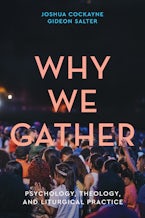Gathering with other people matters. But what does it mean to gather? When is an experience shared, and when is it something we are doing on our own? These questions have grown more urgent in the aftermath of the coronavirus pandemic, which brought into sharp relief the difference between virtual and in-person interaction. Understanding the nature and limits of shared experience has long been of interest to psychologists and philosophers. Research in developmental psychology has explored the role of social interaction and shared experience in human development, highlighting the capacity for joint attention, the ability to attend to some feature of the world with another person with the awareness that this attention is shared.
In Why We Gather, Joshua Cockayne and Gideon Salter focus on gatherings in the context of Christian worship, drawing from several years of grant-funded, collaborative research. They demonstrate that, whether reciting words of formal liturgy, participating in extemporary prayer, or simply sitting in silence with others, we are being asked to attend to something with someone. This is the basis of all liturgy; the shared nature of worship is essential to the Christian tradition.
In dialogue with insights from theology and psychology, Cockayne and Salter explore the nature of gathered worship to show why gathering is so important, and to highlight what is lacking from virtual acts of worship. Primarily a theoretical account that contributes to the ongoing discussion of worship in theology and psychology, Why We Gather also aims to encourage leaders of public worship to reflect more deeply on the shared nature of the practice, thereby understanding how vital it is to not give up meeting together (Heb 10:25). This is innovative scholarship with practical application, an appeal to the church at large.

